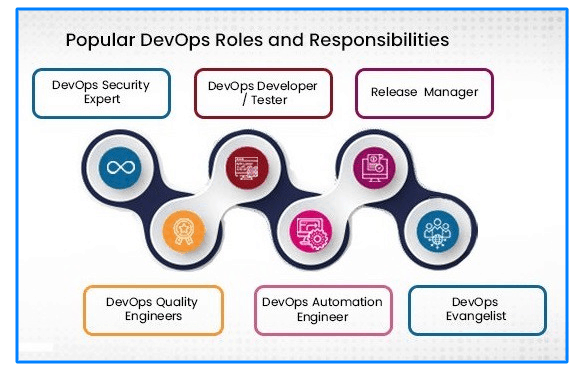Becoming a DevOps Engineer, the first thing that comes to mind is what will be my roles, and what will be my responsibilities after completing the DevOps certification.
In this video blog, we are going to cover Who is a DevOps Engineer, what are a DevOps Engineer Roles and Responsibilities.
If you want to know more about DevOps certification please go through our previous blog on [DOFD] DevOps Foundation Certification Exam and everything you need to know about it.
Index:
Who is a DevOps Engineer?
DevOps Engineers are highly scoped across the industry. DevOps Engineers are IT professionals who collaborate with software developers, system operators, and other IT staff members to manage code releases.
They cross and merge the barriers that exist between software development, testing, and operations teams.
Skills of a DevOps Professional are:
- Business knowledge: DevOps Engineer should have business knowledge as he/she is going to address the gap between business, development, testing, and operations teams.
- Technical knowledge: Profound knowledge of various scripting languages and the latest technologies available in the market.
- Soft skills: DevOps Engineer should be an effective communicator as they will have to communicate and collaborate with multiple teams.
- Self-management skills: A DevOps Engineer should be able to control stress, self-motivation, and manage time.
DevOps Engineer Roles and Responsibilities
 In a successful DevOps industry, following are the roles available in the market along with their responsibilities:
In a successful DevOps industry, following are the roles available in the market along with their responsibilities:
- DevOps Evangelist or leader: A leader or person responsible for implementing DevOps. This is the key role in DevOps.
- Software Engineers, Developers, and Testers: The one who develops the code and test it. The traditional coders and programmers fall under this role.
- Build and Release Engineer: The one releasing new features & ensuring post-release product stability, i.e. integrating the new/ updated features while maintaining the existing framework.
- Automation or Continuous Delivery Architect: The one responsible for achieving automation & orchestration of various automation tools.
- Security Engineer: The one always monitoring the product’s security & health
- Quality Assurance(QA)/Experience assurance(XA): The one who ensures the quality of the product conforms to its requirement.
- DevOps Operations Engineer: The one responsible for maintaining the environment and systems engineering.
- IT Support: The one who monitors and maintains the company computer systems, installs and configures hardware and software, and solves technical problems.
- Agile Service Manager: The one responsible for the application and integration of agile thinking into IT service management.
- Agile Process Owner: The one accountable for the performance of a process and for ensuring that the process delivers value to its stakeholders.
These are the roles that you can apply for once you complete DevOps certification.
Related/References
- What Is DevOps | DevOps Principles | Advantages Of DevOps | Why DevOps?
- Agile Methodology and DevOps | DevOps and Agile Relationship
- [DOFD] DevOps Foundation Certification Exam: Everything You Need To Know
- [AZ-400] Roles and Responsibilities As An Azure DevOps Engineer
- [AZ-400] Microsoft Azure DevOps Certification Exam: Everything You Need To Know
- Certified Kubernetes Administrator (CKA) Certification Exam: Everything You Must Know
Next Task For You
In our [DOFD] DevOps Foundation Training, we cover the DevOps Roles and Responsibilities in DevOps Roles and Consideration module. In this training, we also cover the Introduction to DevOps, DevOps Principle, DevOps Practices, Git, and GitHub.
Begin your journey towards becoming DevOps Foundations certified and earning a lot more in 2020 by joining our FREE Masterclass.
Click on the below image to Register for the FREE MASTERCLASS Now!

The post DevOps Engineer | DevOps Roles and Responsibilities appeared first on Cloud Training Program.